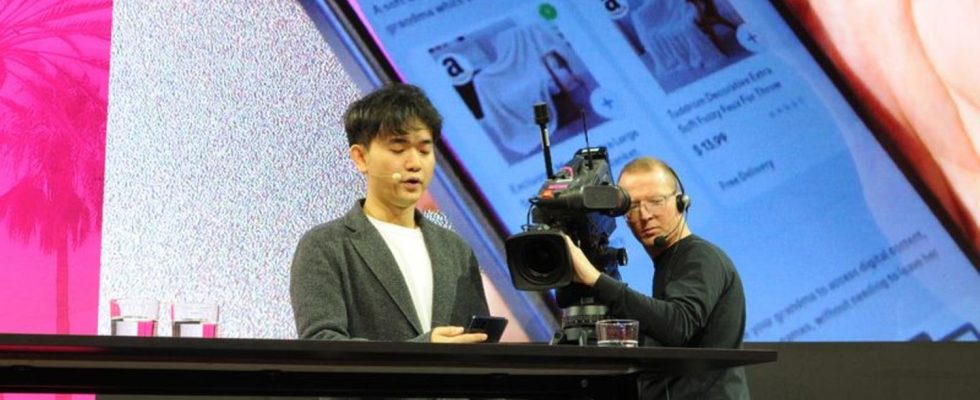Deutsche Telekom has big plans: Together with two US companies, it wants to revolutionize smartphone habits. Thanks to artificial intelligence, apps are expected to become less important.
Whether it’s a navigation system, a shopping portal or video streaming: those who use their smartphone often swipe back and forth to get from one app to the next. If Deutsche Telekom and its US partner Brain Technologies have their way, this is exactly what will come to an end: At the Mobile World Congress (MWC) in Barcelona, the company presented the prototype of a smartphone in which the user no longer sees any apps.
Instead of typing around on the screen, voice commands are enough. Find me a present for my son! Show me the shortest route to my favorite restaurant! Tell me how to make a fire in the forest without matches! An artificial intelligence (AI) concierge then searches the internet and displays solutions on the screen, whether photos or texts. This should be easier than fiddling with different apps.
They are then no longer necessary. The apps can run in the background on the smartphone, but they cannot be seen – they only play a secondary role, if at all. “The smartphone works completely without apps,” emphasizes Telekom innovation director Claudia Nemat. On the project, the Bonn-based company worked together with the AI company Brain Technologies and the chip manufacturer Qualcomm, both from the USA.
Apple and Google continue to rely on apps
The phone used is the mid-range T-Phone smartphone. What’s special is what the technology partner Brain has done with it: The AI that works via the cloud comes from them. There is also a second version of the AI phone that works offline and has a high-speed processor from Qualcomm. It is unclear whether one of these two cell phones, which currently only exist as prototypes, will ever be fully developed and available for purchase in stores.
The founder and boss of Brain Technologies, the 30-year-old American Jerry Yue, is firmly convinced of this. “It will come to market,” says the busy businessman, who made Forbes’ list of the world’s 30 most influential entrepreneurs under 30 in 2022. When asked when the device will be available to buy, he says: “I don’t think you’ll have to wait very long.” With great self-confidence, he appears in front of the audience at Telekom’s trade fair stand and says with fervent conviction that he is on a mission and that is: “The future will be free of apps.” The power that the apps currently have will go back to the users.
Brain and Telekom, which has a strong presence in the USA with its subsidiary T-Mobile and is challenging the heavyweights AT&T and Verizon, have big plans. Apps still play the main role on Apple’s iPhone and phones from major manufacturers with the Google Android system, even if users can partially design the interface themselves with the help of widgets. The iPhone company also offers a watch face for its Apple Watch computer watch on which software algorithms are supposed to display the appropriate information.
When asked about the market launch, Telekom managers are cautious. But even if nothing comes of a finished product in the end, Telekom’s project could herald the end of the app era. An industry representative whose company competes with Telekom and does not want his name published says that the project has potential. “We’ll keep an eye on that.”
Ben Woods from the consulting firm CCS Insight sees a strong trend towards artificial intelligence in the mobile communications industry. Telekom’s AI phone is an interesting example of what the future could look like. The fact that the smartphone has now been presented to the public as a tangible prototype is a remarkable step, especially since a network operator is doing this.
Will the market launch be successful?
Telekom is apparently firmly convinced that it can differentiate itself from the competition with such a product, says the industry expert. However, he is currently skeptical about a market launch. Woods also sees “the risk of hype” that differs from reality, noting that network operators have not been particularly successful with hardware so far.
Telekom emphasizes that it is concerned with customer loyalty – that is, that customers remain loyal or switch to Magenta because the device offers new options. Annette Zimmermann from the consulting firm Gartner expects that the industry will release even more devices of this type in the future.
And how does the competition react to the Telekom prototype, which could potentially usher in the farewell to apps? Vodafone makes it clear that it believes apps will continue to be important in the future. Marcel de Groot, the managing director responsible for private customers, says that the use of artificial intelligence could revolutionize the operation of smartphones in the long term. But any sustainable change takes time. “We believe that smartphone manufacturers and app providers will initially adapt their services and applications so that data exchange with other apps and operating systems via AI functions works more easily and better.”

